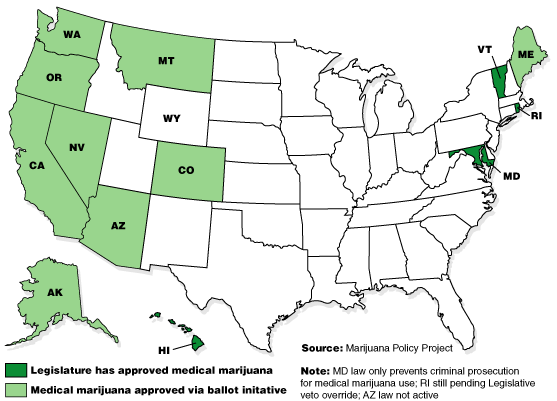July 8th, 2016 marked the one-year anniversary of retail cannabis sales in the state of Washington, and while the implementation of I 502 has been a success on many levels, a recent change in cannabis laws regarding medical marijuana enacted during the last legislative session have mandated many radical and unpopular changes to the nation’s second oldest medical marijuana program … for an update on cannabis in Washington state CPM’s Brian Bahouth spoke with Michael Stusser, Seattle Weekly columnist and host of Higher Ground TV … listen to this mix of words and music …
About the Author
Michael is a journalist and filmmaker. His award-winning documentary, Sleeping with Siri is playing film festivals across the country. Stusser runs TechTimeout campaigns in high schools across the country, asking teenagers to give up their digital devices (for a little while) in order to find balance, and perhaps even make eye-contact with their parents.You Might also like
-
(Odd) Oregon News: Top Addiction Expert Kicks off YES Ad Campaign
The “Yes for Legalization” Campaign in Oregon State got a boost from a seemingly unusual supporter: Richard Harris. As the former director of Addictions and Mental Health Services for the state of Oregon, Harris held the highest position for directing drug treatment and addiction programs in the entire state.
READ MORE
-
weedWatch Parody of Apple Watch Advocates “Time for a Change”
“weedWatch” Parody of Apple Watch Advocates “Time for A Change”FOR IMMEDIATE
RELEASESeattle, WA – Coinciding with the marijuana holiday 420 and the release of the Apple Watch on April 24th, a Seattle-based multi-media company, Higher Ground, has created a parody ad to bring attention to marijuana legalization. The ad (“WeedWatch”) features a photo of the iWatch with the simple text, “Time for a Change: Legalize It.” A variety of marijuana-related icons and apps are featured on the device’s face.
One of the most innovative features of Apple’s Watch is the ability for users to customize the face of the device, and add additional information. In Higher Ground’s parody, they have taken the liberty to do just that! The watch face is full of humorous and advocacy-related apps including NORML (National Organization for the Reform of Marijuana Laws), SXSW, Leafly (a Yelp-like mobile app for marijuana), 7-11, Cannabis News Network, and Doritos. The time? 4:20.
“The Apple Watch is a revolutionary product, and the legalization of marijuana in States across the country is also a revolutionary movement,” notes Higher Ground Editor-in-Chief Michael A. Stusser. “The message of our parody is as simple as the solution to the War on Drugs: Legalize It. It’s time to end Prohibition, and legalize, regulate and tax cannabis at the federal level.”
Based out of Seattle, where recreational marijuana was legalized in 2012, Higher Ground is attempting to “Elevate the Dialogue” and broaden the movement nationally. While legal in Washington, Colorado, Alaska and Oregon, the use, sale or distribution of cannabis is still a felony at the federal level, and over 600,000 Americans are arrested every year for marijuana-related offenses. The parody ad is being strategically placed in weekly newspapers (and on-line) in states where marijuana initiatives are being proposed, including Ohio, California, Nevada, Maine, Michigan, Massachusetts and Arizona. It will premiere as a full page ad in the Marijuana Green Pages.
The launch of the Apple Watch continues to garner significant media coverage, as it is the first new product device from Apple since CEO Tim Cook took over the company. PreOrders for the iWatch began on April 10th, selling over a million units, and will begin shipping on April 24th. Using guerilla-style marketing, Higher Ground’s WeedWatch campaign will appear on posters, leaflets and mobile billboards adjacent to Apple stores nationwide.
ABOUT HIGHER GROUND
Higher Ground produces the world’s first satirical news program about the legalization movement, along with a newspaper column and website. A multi-media company, Higher Ground creates highly-produced video assets including a flagship program (a mix between The Daily Show and CNN, just without that annoying Wolfe Blitzer fellow), a syndicated column on the legalization movement, a comprehensive and entertaining news website, events (Cooking with Cannabis!), along with viral social-media parodies.
Higher Ground has created a variety of videos and parodies that attempt to vaporize stoner-cliches (including a ReMix of Cheech & Chong’s iconic “Up in Smoke”), while also educating the public on the changing landscape of legalization. Along with their YouTube videos, the company has repurposed posters from the Reefer Madness era with an Original Artists Series, updated MadMen (whose characters smoke from vaporizers instead of cancer-sticks), and even crafted a Seattle Seahawks logo entirely out of marijuana in honor of the Beast Mode strain (named after running back Marshawn Lynch). Stusser’s Higher Ground column also runs in the Seattle Weekly.
Higher Ground explores and celebrates the elevated aspects of getting high. Founded during a revolutionary time of economic and spiritual transformation in the legalization movement, the brand will document and chronicle this incredible time in our history, and advocate for the legalization of cannabis (along with civil rights, gay rights, and human rights), and embrace the end of – yet another – prohibition.
For more information, contact Michael Stusser at michael@michaelstusser.com###
-
THE TIDE HAS TURNED
Great article from Josh Voorhees, our favorite SLATE contributor
Courtesy of Slate –
An overwhelming majority of Americans believe that the legalization of marijuana is inevitable. We’ll soon find out if they’re right.
Voters in Alaska and possibly Oregon will decide this November whether their states will join Colorado and Washington in legalizing the commercial sale and recreational use of pot. Similar initiatives are at varying stages in more than a half-dozen other states—Nevada, Arizona, and California among them—where advocates are looking toward 2016, when they hope the presidential election will turn out enough liberals to push those efforts across the finish line. All told, more than 1 in 5 Americans live in states where marijuana use has a legitimate chance to become legal between now and when President Obama leaves office.
It’s not just at the ballot box where the pro-pot crowd is putting points on the board. Lawmakers in at least 40 states have eased at least some drug laws since 2009, according to a recent Pew Research Center analysis. According to the Marijuana Policy Project, proposals to treat pot like alcohol have been introduced in 18 states and the District of Columbia this year alone. Meanwhile, 16 states have already decriminalized marijuana, according to the pro-pot group NORML—Maryland will become the 17th in October. In large swaths of the country getting caught with a small amount of weed at a concert is now roughly the same as getting a speeding ticket on the way to the show. While not leading the charge, the Obama administration is allowing states the chance to experiment. The feds have given a qualified greenlight to Colorado and Washington to dabble in recreational weed, and have even taken small steps to encourage banks to do business with those companies involved in the quasi-legal pot trade.
Given this momentum, it’s not difficult to see why 75 percent of Americans—including a majority of both those who support and those who oppose legalization—told Pew pollsters in February that they now believe it’s a matter of when, not if, the nation’s eight-decade-long prohibition of pot ends. The question is: Are they right?
This moment isn’t the first time that the United States appeared on the cusp of legalization. After steep gains in popular support during the early and mid-’70s, support for legalization climbed to 30 percent in 1978, only to plummet back into the teens the following decade as Baby Boomers became parents and Jimmy Carter’s pro-decriminalization administration gave way to Ronald Reagan’s war on drugs. “This was supposed to be inevitable then,” says Kevin Sabet, a legalization opponent and former Obama drug policy adviser who helped found Smart Approaches to Marijuana after leaving the administration. “No one could have predicted that [support]would have been wiped away so quickly.”
The pro-pot crowd isn’t ready to declare victory either. Ethan Nadelmann, who heads the Drug Policy Alliance and has spent decades in the reform trenches, says he’s of two minds when he thinks about the future. “On the one hand we have this extraordinary momentum,” he says. “On the other, public opinion can be fickle and marijuana is not going to legalize itself.”
While such caution is reasonable, it’s obvious that things are different now than they were 40 years ago, when then-record levels of support for legalization were good for little more than a vocal minority. It wasn’t until 2013 that a majority of Americans said for the first time that they supported making it legal to use weed. Support now stands at 54 percent in the most recent Pew poll, 23 points above where the legalization effort stood as recently as 2000 and 13 points higher than in 2010. Even those fickle Baby Boomers are back on board, with 52 percent now in favor—5 points more than that generation’s 1970s-era high. Meanwhile, each passing year brings us an electorate more familiar and less fearful of marijuana.
It’s not just a matter of shifting demographics. There’s also the fact that voters have increasingly gotten an up-close look at state-legal weed in the form of medical marijuana. Twenty-one states and the District of Columbia have legalized pot for medicinal purposes to varying degrees since California became the first to do so almost two decades ago. Voters in Florida are set to decide later this year whether they want to join that group, something that would give advocates their first voter-referendum victory in the South. (Florida law requires at least 60 percent support, however, making it a heavier lift than it has been in other states.)
Some pot opponents warn that medical marijuana serves as a Trojan Horse for the larger legalization movement, but that argument relies on Americans believing that the dangers of possibly legalizing recreational weed tomorrow outweigh the benefits of actually prescribing it to cancer patients and others in need today—a viewpoint shared by a diminishing number of Americans. While 54 percent of respondents told Pew they thought “the use of marijuana” should be made legal, things were more complicatedwhen the question changed from a simple yes-or-no to one where people were asked to pick between three choices: 39 percent said that pot “should be legal for personal use”; 44 percent said it “should be legal only for medicinal use”; and 16 percent said it “should not be legal.” Still, the answers to the original question—“Do you think the use of marijuana should be made legal, or not?”—suggests in an all-or-nothing environment, most Americans choose the former.
Regardless, medical marijuana has already served as stepping-stone for states that have or are considering regulating the sale and use of recreational pot. In Colorado, where retail stores opened their doors on New Year’s Day, advocates were able to point to the state’s tightly regulated medical market, approved by voters in 2000, to allay fears that the state couldn’t regulate a marijuana market from scratch. To date, Colorado regulators have delivered on those promises, building a relatively hiccup-free commercial market on the back of the medical marijuana industry. (Things in Washington, where the medical market is unregulated, have proved a good deal more complicated. Residents are still waiting for the first retail stores to open 19 months since the 2012 vote.)
Medical marijuana has become so relatively uncontroversial that late last month the House of Representatives shocked almost everyone when a bipartisan majority voted to block the Drug Enforcement Agency from pursuing medical marijuana operations that are legal under state laws. “Watershed is probably too strong of a word,” says Nadelmann of the unexpected vote for a bill that had repeatedly stalled in the same chamber for the last decade, “but it was pretty close.”
Legalization in theory is different than legalization in practice, and an unforeseen disaster in Colorado or Washington—be it from the production of hash oil or the next time a New York Times columnist overindulges in baked goods—could always affect public opinion. Colorado Gov. John Hickenlooper, a Democrat who opposed his state’s 2012 legalization initiative, for one, has warned his fellow governors to take a wait-and-see approach to their own state’s legalization efforts. But it’s looking increasingly like the voters may not be so patient if given the choice.





